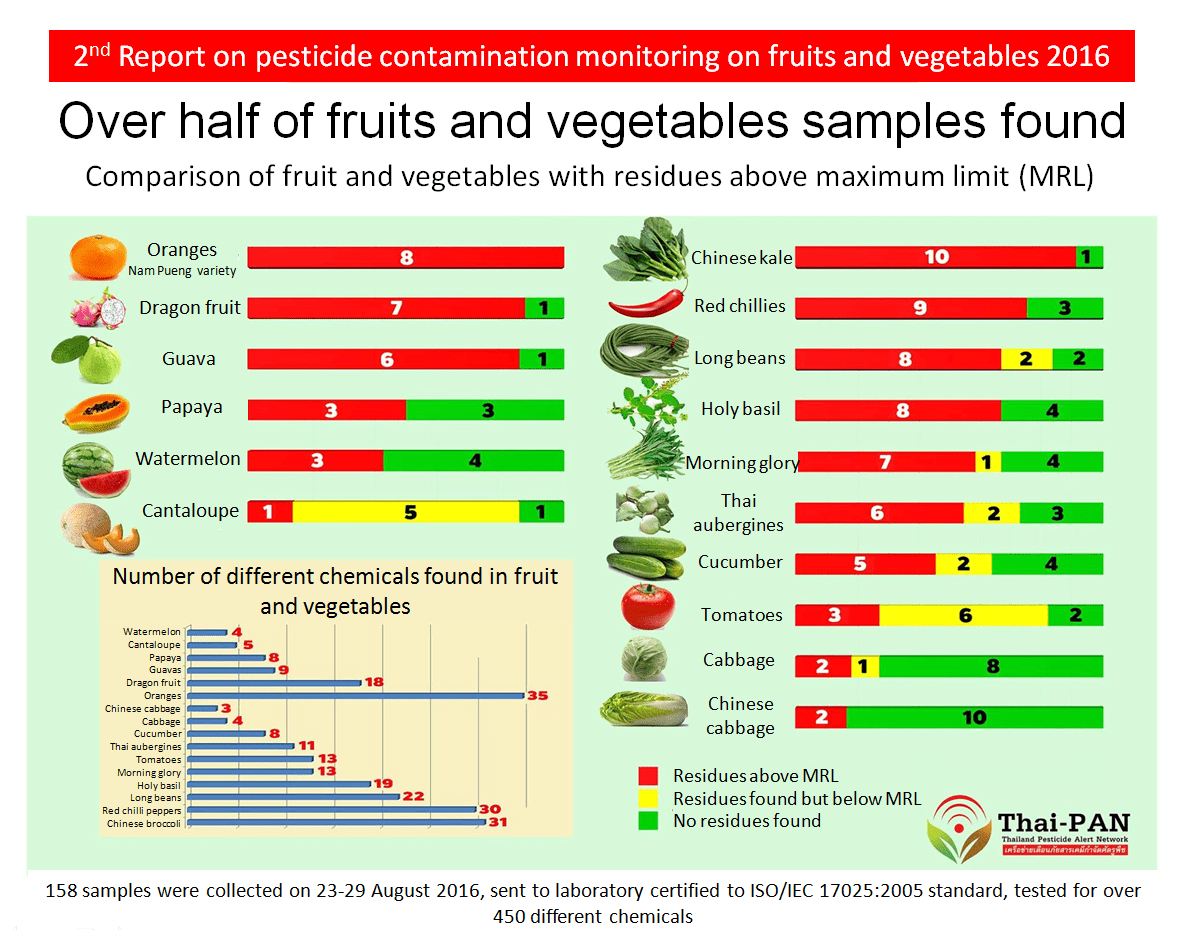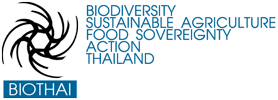
Thai PAN has published the results of their second round of testing on chemical pesticide residues for 2016. It found that just over half the samples of fruit and vegetables tested contained chemical pesticide residues. Fruit and vegetable from supermarkets and labelled with the Q Mark were most frequently found to have problems. Once again, oranges, Chinese broccoli (kana) led the pack as the most frequently unsafe.
As many as 20% of all samples tested were found to be contaminated with chemical pesticide residues that have already been banned and are not permitted in Thailand.
Today, the Thai Pesticide Alert Network (Thai PAN), led by its Coordinator Prokchol Ousap, held a press conference to release the results of the second round of testing on chemical pesticide residues in fruit and vegetables for 2016. Random samples of 16 commonly consumed fruit and vegetables were collected on 23-29 August 2016. This included red chilli peppers, holy basil (kaprao), long beans, Chinese kale (kana’), morning glory (pak bung), Chinese cabbage (prakadkhawpli), cabbage, cucumber, Thai aubergines (makueapro’), and tomatoes. The 6 fruits tested were oranges (Nam Pueng variety), papaya, watermelon, cantaloupe, guavas, and dragon fruit. A total of 158 samples of fruit and veg were obtained from various sources. Own brand and unlabelled produce were collected from three modern supermarkets, Big C, Makro, and Tesco Lotus, and from three wholesale freshmarkets, Taladt Thai, Taladt Pathom Mongkol in Nakorn Pathom province, and Talat Sri Mueang in Ratchaburi province. In addition, samples of fruit and vegetables labelled as “safe” and “organic” were collected from major stores and supermarkets such as Gourmet Market, TOPS, Home Fresh Mart, Max Value, Villa market, Lemon Farm, Golden Place, and Foodland. The samples were analysed in a laboratory certified with the ISO/IEC 17025:2005 standard, and tested for over 450 different chemicals for chemical pesticide residues using a multi-residue pesticide screen (MRPS).

Overall, it was found that, of the 158 samples of fruit and vegetables, 56% had residues above the maximum allowable limit (MRL). Ms Prokchol revealed that the source from which fruit and veg samples were most frequently found to have excessive residues were the modern trade outlets. As many as 70.2% of the samples from these three sources had pesticide residues above the maximum limit. From Tesco Lotus, 12/16 samples were unsafe, while Makro was next with 11/16, and Big C with 10/15 samples. As for the freshmarkets, a total of 54.2% of samples had pesticide residues at levels above the maximum limit. The results for Taladt Thai were 10/16; Taladt Patom Mongkol 9/16; and Talad Sri Mueang 7/16. Prokchol noted “Talad Sri Mueang has initiated an interesting project, promoting the production of safe produce by farmers, dedicating one building to the sale of these products.
The results clearly show that this was the source where the fewest contaminated products were found.” The vegetables which were most frequently found to have excessive pesticide residues included Chinese kale with 10/11 samples, other results included red chillies 9/12, long beans and holy basil 8/12, morning glory 7/12, Thai aubergines 6/11, cucumber 5/11, tomatoes 3/11. Meanwhile cabbage and Chinese cabbage were the least frequently contaminated, with 2/11 and 2/12 samples, respectively, found to have residues above the MRL. These results were consistent with the results of Thai PAN’s previous monitoring of residues over many years. As for the fruits, those most often found to have excessive chemical pesticide residues were Nam Pueng variety oranges for which all samples (8/8) were found to be contaminated. Results for the other fruits were dragon fruit 7/8; guavas 6/7; papaya and watermelon 3/6, and 3/7 respectively; and cantaloupe 1/7. The test results revealed that vegetables which carried labels certified by the Ministry of Agriculture and Cooperatives were also frequently contaminated. In particular, the Q Mark was found to have excessive pesticide residues in 16/26 samples or 61.5% of samples. This is a higher frequency than the results of the testing carried out in March this year, when 57% of Q-marked samples were found to be contaminated. Fruit and vegetables labelled “safe”, but without any associated certificates, were found to have residues above MRL in 5/10 samples. Fruit and vegetables which have the Organic Thailand brand, certified by the National Bureau of Agricultural Commodity and Food Standards, were found to have excessive pesticide residues in 2/10 samples.
Other certified organic labels returned similar results, ie 2/9 samples. Produce which was labelled as “organic” and sold in different modern trade stores, but which do not refer to any certification scheme, were found to have excessive pesticide residues in 4/8 samples. “One thing we need to realise is that chemical pesticides classified as type 4 hazardous materials –which are no longer allowed to be used in Thailand, that is Dichrotophos, Endosulfan, Methamidophos, and Monocrotophos – as well as type 3 hazardous materials which have not been authorised for use by the Department of Agriculture, that is Carbofuran and Methomyl, were found in 29/158 samples of fruit and vegetables, or 18.4%.” said Prokchol Ousap. Kingkorn Narintarakul Na Ayudthaya, of the Food For Change campaign, which works on food issues together with Thai PAN, called on the government to raise the issue of chemical pesticides safety as a national agenda. She noted that in Japan and the European Union, excessive chemical residues are only found in 3-5% of samples. She also called on the relevant government agencies to reform, as a matter of urgency, the food standards certification system of the National Bureau of Agricultural Commodity and Food Standards. She said they should stop trying to promote organic agriculture standards, because it is not possible to show that produce labelled with government certification marks are any safer than other general produce on the market. Concerning the finding of prohibited chemicals in fruit and vegetables, Ms Kingkorn said “it is the responsibility of Suwit Chaikiattiyos, as the new Director General of the Department of Agriculture, to sort this out. He should cooperate with the Consumer Protection Police Division, using the evidence provided by Thai PAN to trace back and arrest those possessing or selling the above chemicals, who should be punished without delay”. “Consumer groups should keep a close eye on the actions of the different government agencies involved and should be ready to collaborate with Thai PAN to use legal measures and consumer campaigns to reform our food and agriculture system to be safer in the future” said Ms Kingkorn.
